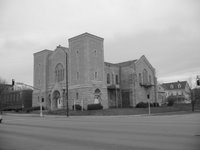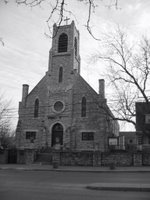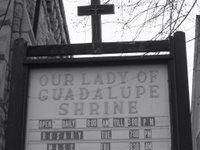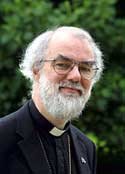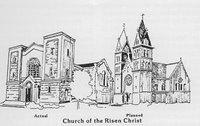[July 16: I've updated this by adding photos, and just rewriting and reorganizing this post]In perusing This Far by Faith for information on closed churches, I ran across two open churches that I have to comment on, at least in passing. GUARDIAN ANGELS
The first, Guardian Angels on Westport Road, was originally planned with a grand campanile, but it was never built.
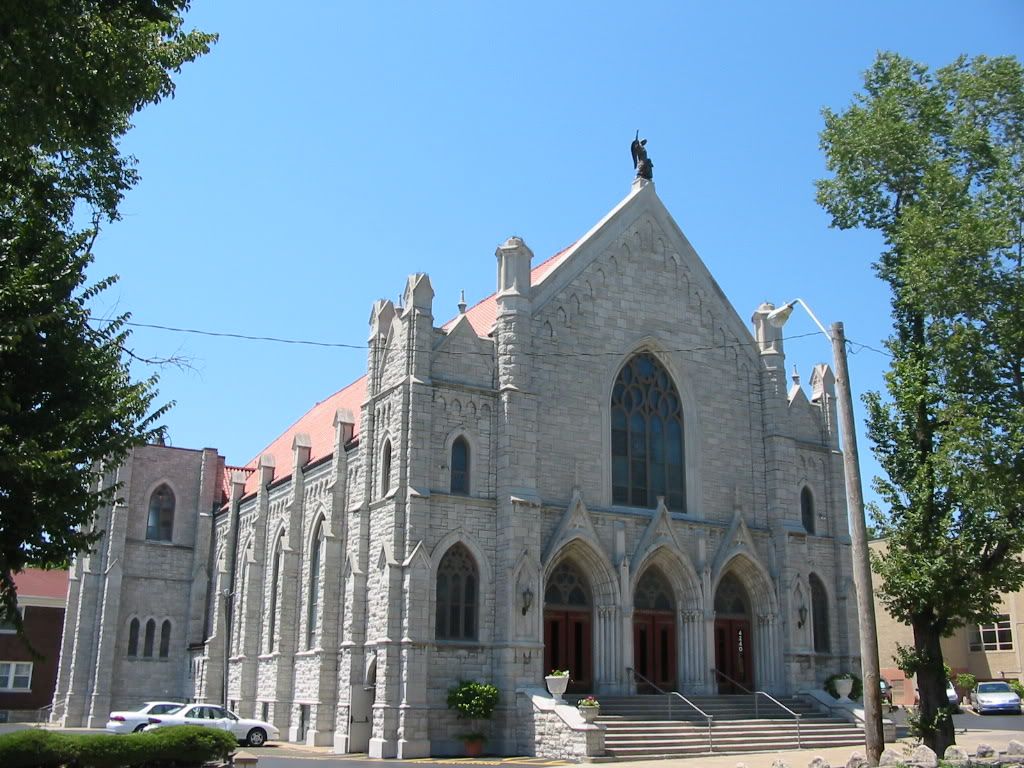

Yes, this is one of those churches you want to stop at as you drive by, because the interior must be specatular, right?
Wrong! This place has been thoroughly vandalized in the spirit of Vatican II and is now as ugly as anything you can find in Johnson County or way-out south in KCMO.
We'll start with close-ups of the old high altar, decorated for Easter or Christmas. Christmas, I think. Like that altar? Like those murals? Like the gold leaf in the vaulting?

Obviously somebody didn't. Now we'll look at what they did, starting in 1966. Doesn't it bring tears to your eyes?
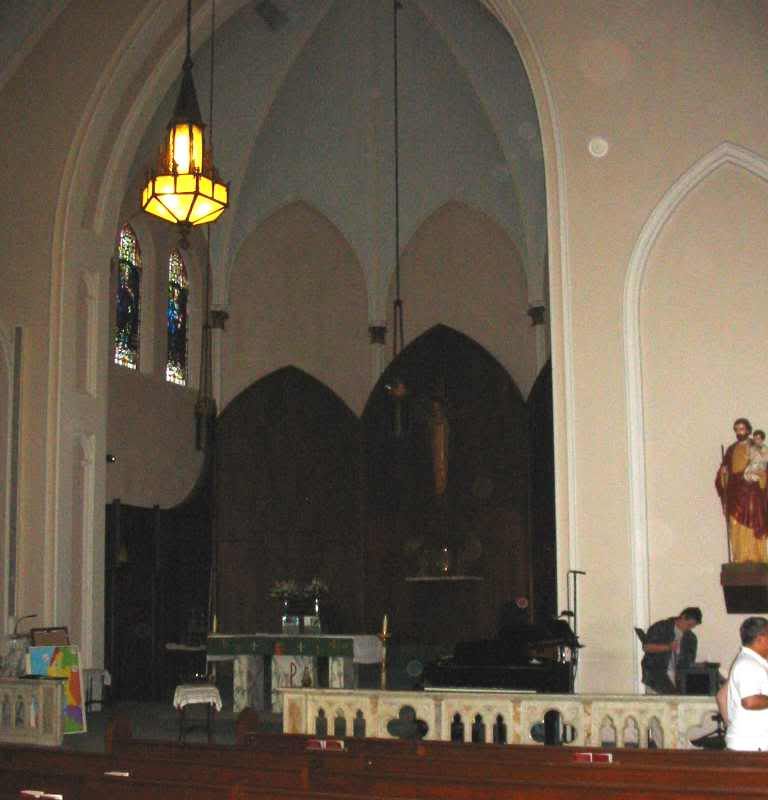
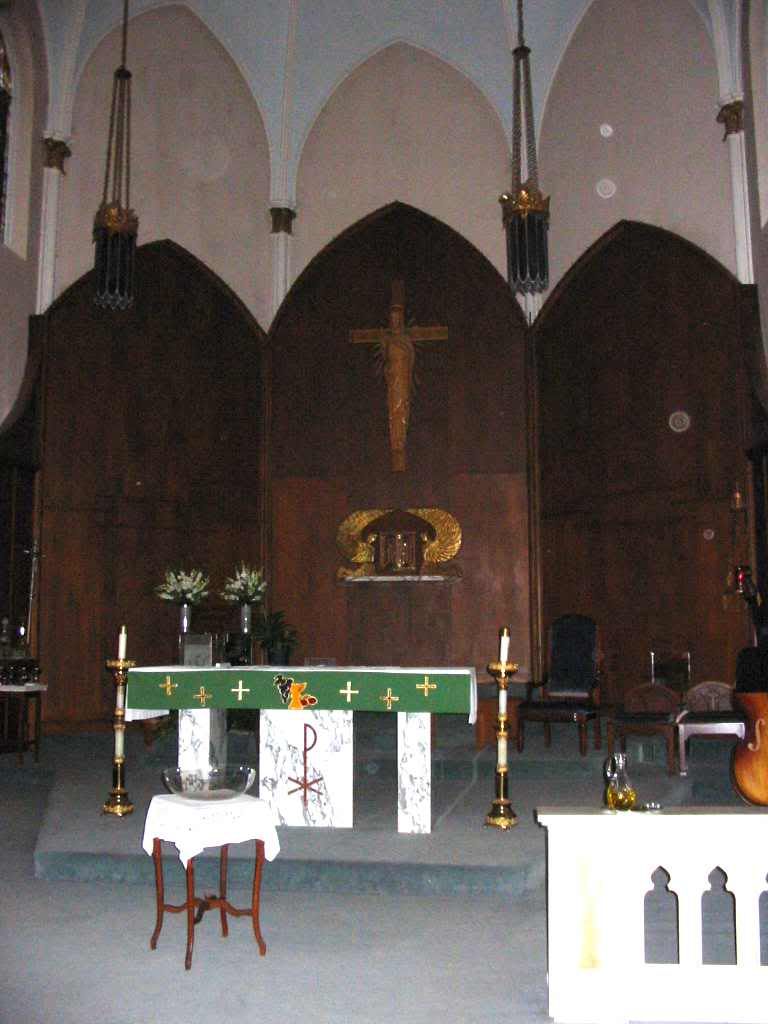
Note the resurrected Christ on the crucifix (no suffering here, folks, unless you're a traddie!!!). Note the baby-blue carpet, like what was pulled out of Old St. Pat's recently. Note how they lowered and darkened the arches with that stained plywood. Symbolic of the lower, cheaper aspirations of the church today, would you say? What on earth do you say to people who thought this was an improvement? Ugh. Those poor donors who originally gave to the construction of the church! Perhaps seeing this from above is enough suffering to get them out of Purgatory? And what sort of sheep are we, to let the wolves sweep in and destroy something so beautiful in the Spirit of Vatican II?
Anyways, Guardian Angels is, for all intents and purposes, a loss. As you can see below sanctuary has been wrecked, and for many years it's been run by laymen, rather than priests, with sacramental services provided by those lovable Jesuits.
There's apparently a big capital campaign afoot to do another renovation. Here's the little model that they have in the back of the church:
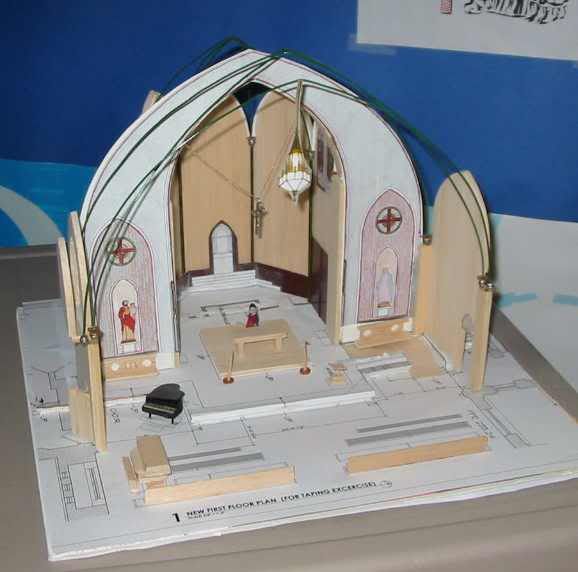
Instead of the restorations like you're seeing elsewhere in the diocese, like St. Anthony, where the sanctuary once again has a high altar, as it was intended to (and as is more fitting to our Lord), these people have more of the same planned. Finally, they'll get rid of the last of that awful, hierarchical communion rail, and they'll have a piano up front so they can see who's performing more favorites from Marty Haugen!
OUR LADY OF GOOD COUNSEL
The second, Our Lady of Good Counsel at 39th and Washington (also in Westport), is still a somewhat beautiful church. The high altar remains, and (although as late as 1996 it was surrounded by a sea of (nearly empty) chipped blond wood veneer pews, green/gold carpet, and walls the color of what gets deposited in my nursing infant son's diapers). Back then, there were three separate islands for the newfangled ambo, altar, and cantor stand built up from the floor just outside the sanctuary, and in the Spirit-of-You-Know-What, the highest island wasn't for our Lord on the new altar--it was for the cantor (back then, by the way, the Glory n' Praise books were still in the pews from the pastor's predecessor, but happily, the pastor didn't let the music director actually use them. They were replaced with Adoremus hymnals as soon as they came out.)
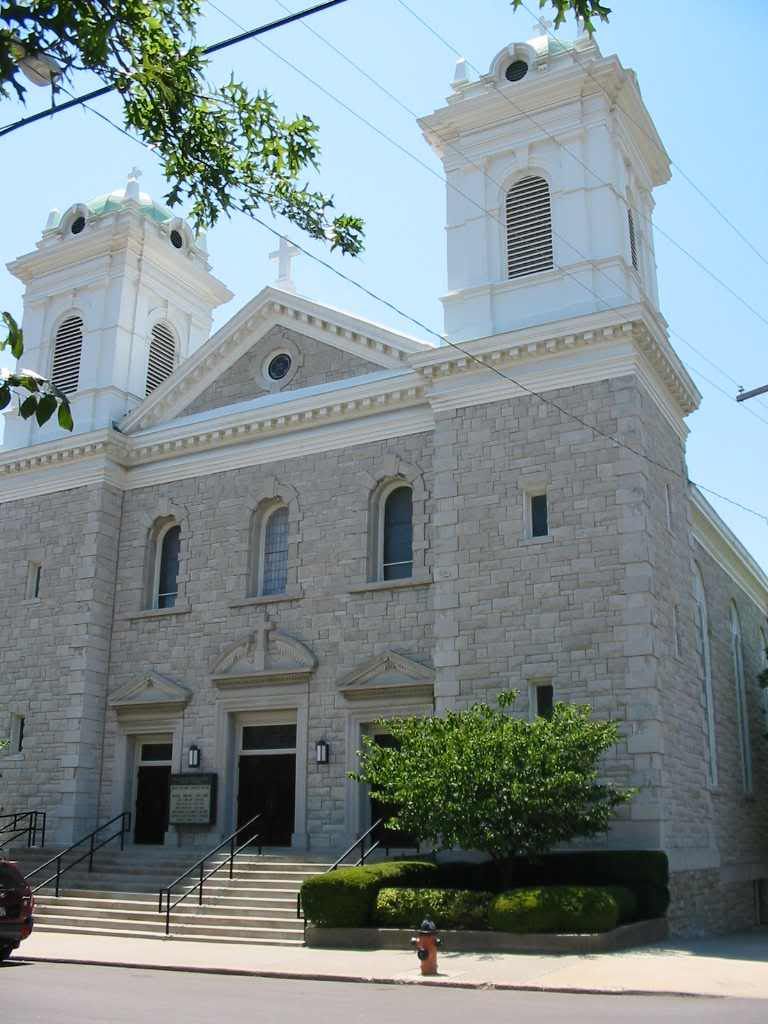
Anyways, the septuagenarian pastor (now an octogenarian, and still pastor) has managed to restore Good Counsel to some semblance of its original beauty with new oak pews, appropriate carpet and tile, white walls with gold accents on the columns, a orderly and somewhat less objectionable arrangement of the newfangled altar and ambo. If you're in Kansas City, and you're not interested in the Tridentine Mass (and yo should be, BTW), this is the place to go for a good novus ordo--as reverent as the NO can be, with a Latin Kyrie, Gloria and Agnus Dei. Most people receive our Lord on the tongue, with many kneeling. There's been a transformation in the congregation here over the last ten years as well. Where once there were a couple dozen old ladies at Mass every Sunday, now there's a nave full of families and a vestibule full of kids--nearly all homeschooled. I'm told collections have increased eight- or ten-fold, and with that money has made long-neglected and substantial structural and mechanical restorations to the church and parish plant. Unfortunately, though, some of the damage done by the wolves, such as the loss of most of the altar rail, the ceiling fans and the messed up lighting, and 12"x12" acoustic tiles over the ceiling, remains.
But I digress. Here's my point:
Today there is inoffensive non-representational stenciling behind the side altars and in the sanctuary that I thought was original, or at least very nearly so. However, in This Far by Faith, I found a photograph of the sanctuary as it appeared before a 1955 renovation. Wow. Where that stenciling is now, there were murals (of what subjects, I could not tell). There were beautiful light fixtures hanging in the nave, too. What a pity that they're gone! Even with all the good work that pastor has done in saving the parish and restoring the building, he'll never be able to completely undo the damage done over the years.
UPDATE APRIL 11.
I've found photos of the old Guardian Angels and the old Good Counsel interiors. I've been waiting to post them until I could get over and take new shots of the interiors, but I've just never made it over (no, I don't have a good excuse--I do live in midtown where they are now located). Anways, here I'm posting what I've got.
 First, the original sanctuary at Good Counsel before the 1955 rennovations, and second, the sanctuary from an early-1990s photo.
First, the original sanctuary at Good Counsel before the 1955 rennovations, and second, the sanctuary from an early-1990s photo.  Happily, the pastor keeps the ugly modern altar table covered now, and things have been somewhat restored. You can see the high altar in color in the background.
Happily, the pastor keeps the ugly modern altar table covered now, and things have been somewhat restored. You can see the high altar in color in the background.
 building is the Don Bosco center of Kansas City (no, the place wasn't crawling with Salesian priests).
building is the Don Bosco center of Kansas City (no, the place wasn't crawling with Salesian priests). it's obviously been torn down.In fact, the good people of St. John the Baptist, if they did indeed get moved to Assumption/St. Anthony, landed in a place much more suitable for Catholic worship.
it's obviously been torn down.In fact, the good people of St. John the Baptist, if they did indeed get moved to Assumption/St. Anthony, landed in a place much more suitable for Catholic worship. populations shifted, most of the folks were living east of the Paseo. In 1954, the original church, shown below, was closed, and eventually, it was torn down in a widening of the Paseo. The parish met in the school chapel at the site shown above, and in 1959, the school gym was converted into the church (those of you who said, "Oh boy, another church that looks like a gym," as you were reading above, there you have it.
populations shifted, most of the folks were living east of the Paseo. In 1954, the original church, shown below, was closed, and eventually, it was torn down in a widening of the Paseo. The parish met in the school chapel at the site shown above, and in 1959, the school gym was converted into the church (those of you who said, "Oh boy, another church that looks like a gym," as you were reading above, there you have it. 







 First, the original sanctuary at Good Counsel before the 1955 rennovations, and second, the sanctuary from an early-1990s photo.
First, the original sanctuary at Good Counsel before the 1955 rennovations, and second, the sanctuary from an early-1990s photo.  Happily, the pastor keeps the ugly modern altar table covered now, and things have been somewhat restored. You can see the high altar in color in the background.
Happily, the pastor keeps the ugly modern altar table covered now, and things have been somewhat restored. You can see the high altar in color in the background.